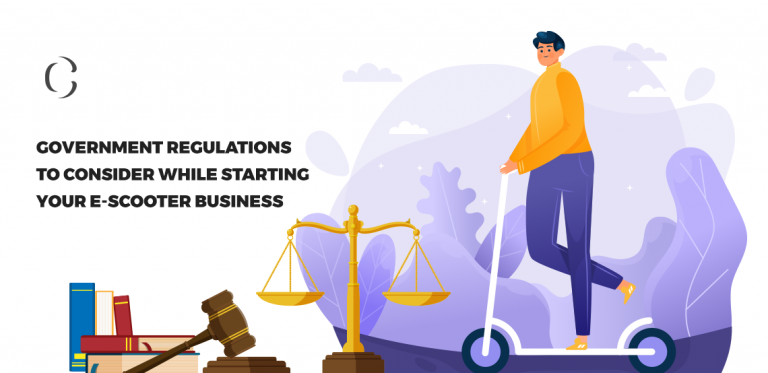Government Regulations and laws to keep in mind for e-scooter startups

With the crowd of E-scooters and dockless bicycles suddenly appearing on the streets of many cities and as they are showing a real demand for single-occupant vehicles, there are various challenges to be faced by both e-scooter rental companies and the government agencies.
As per the quote of Schumacher, we are experiencing almost universal idolatry of gigantism. So, it becomes necessary to insist on the virtues of littleness. The concept of micro-mobility supports just the same.
From a few years, the set of services is growing faster and challenging gigantic transportation. There are various forms of personal, frequently single-occupant cars—and championing the ideals of littleness. To move people over relatively short distances the electric scooters, docked and dockless shared bikes, and other vehicle types are shrinking the physical footprint.
The micro-mobility services have resonated with customers, as revealed by their fast adoption over just the last several months. They have the potential to completely relate people with public transportation. They also lessen dependence on private cars and make the most of the current space by “right-sizing” the wheels. All of this is provided while reducing greenhouse gas discharges
However, many of the e-scooter and e-bike startups have faced resistance, backlash, and growing pains. We have always seen most visibly the truly rocky relationship between city governments and e-scooter providers.
Let’s check out what regulations have been applied in various countries to control the micro-mobility solutions:
Government Regulations and laws to keep in mind for e-scooter startups
» The market
Right now, we are just witnessing the inception of the micro-mobility revolution ~€170billion.
On-demand mobility is growing at ~20% per year. This growth of mobility is fueled by a few things which include:
- People not wanting to drive their cars
- Tech enabling admittance to vehicles
- Tech facilitating mapping and payments
- More compliant jobs and lesser routines
- Most trips taken by people are short-distance trips
- Trips limited to 15km are properly approached by micro-mobility vehicles
- Fits very well in unification with long trips.
» Goals of Cities
Before learning about the regulation policies in cities, we must know the goals of the cities and why these policies are implied:
1- A sustainable and healthy market
Provide a competing environment with two or more businesses authorized
- Rather than subsidizing single business, subsidize all businesses per ride
- Compel data-sharing
- Protect against greedy pricing which includes operators running below-cost service to kill competition and loss-making operators with the smallest price floor
2 Space management
● Apply a capped maximum number of vehicles based on usage and allowing more vehicles at min 2 trips per day
● Apply a cap to max no of vehicles in any given spot.
● Strict guidelines where vehicles cannot be parked / where vehicles can be parked
3 Activity
● Support bikes over other vehicles using allowances, subsidies/taxes
4 Cost of living
● Grant subsidies/decrease taxes to assure micro-mobility services are affordable for everyone.
5 Connected mobility
● Achieve standards on aggregation availability
6 Safety
● Guarantee the quality of bikes
● We need policy development for how the e-scooters are used and the quality of e-scooters.
7 Environmental influence
● Handling business operations with less congestion or pollution
● We need to check out the asset lifetime, and what happens to these assets after usage
Some people might have the opinion that regulation only a stifling obstacle to micro-mobility. They might also feel that local governments will end up destroying the ecosystem with rules and fees.
But reasonable regulation is precisely what this niche needs to drive broad adoption. With the consent from the jurisdiction, safety, which is a significant part of mainstream approval, will be properly directed.
Moreover, e-scooter rental service operators will be able to manage business openly and without concern of the city shut them down overnight. This will render the stimulus for operators to track pilot projects and to investigate markets. This will also ensure the knowledge that all of the contenders in the space will be constrained to the same set of rules.
Possibly most importantly, the government analysis leading to recognition also suggests that local governments will fully welcome micro-mobility as an influential factor in their smart city plans. Refashioning city essences to promote and encourage e-scooter and e-bike traffic. This also implies that e-scooter and bike rental companies must work jointly and amenably with municipalities. That comprises using a “commons” approach, such as the mobility data framework approved by NACTO.
Micro-mobility rental companies should be attending local governments and regulators as partners rather than restrictions and recognizing the critical role they play in bringing about positive change in our urban cores. The regulators are needed by operators and the cities need the operators. This is how technology moves forward.
Operators need to work to make sure that their services further city goals. In order to exhibit their value to the overall transportation network. They can start this process with an early and constant conversation with city leaders to completely understand where their transportation pain points are. Operators can then change the processes to tune in fine the where, when, and how of their micro-mobility deployments to help address the city’s preferences.
They should take note of reducing congestion, solving the first-mile/last-mile problem, enhancing air quality, or improving access for underserved communities. They should also be sensible to city interests about creating dependencies on private sector providers.
» Conclusion – How Coruscate Can help E Scooter startups to deal with Government Regulations
Since there are numerous concerns in the future of mobility, the crux of the micro-mobility hurdle typically rests in finding the right balance among safeguarding today’s public affair and still promoting discoveries that can eventually serve customers and the larger transportation system. As micro-mobility has several possible benefits, there likely subsists a balance that attends the interests of cities, citizens, and service providers.
As the demand relationship is built on trust among every party, the operators need to make space for the new entrants as well and solve the issues together. Though there is no single formula which can be applicable everywhere, by working through the spiky issues now, acquiring information from new data, and understanding to heart key lessons, each one of them can be better armed when the next mobility innovation like such as autonomous vehicles moving people and good comes onto the picture.
We have prepared a whole document in detail where you can find the government regulations applied in various cities in the US and other countries. To set up your business from scratch, you need to study each detail regarding the regulations and policies. Connect with us to discuss more regarding launching the e-scooter business in different cities. We can help you to set up your business and become your technology partner to boost your business with our latest technologies.









